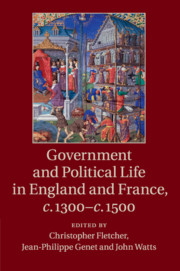Book contents
- Government and Political Life in England and France,c. 1300–c. 1500
- Government and Political Life in England and France,c. 1300–c. 1500
- Copyright page
- Contents
- Contributors
- Preface
- 1 The government of later medieval France and England: a plea for comparative history
- 2 Courts
- 3 Kings, nobles and military networks
- 4 Offices and officers
- 5 Royal public finance (c. 1290–1523)
- 6 Justice, law and lawyers
- 7 Church and state, clerks and graduates
- 8 Political representation
- 9 Grace and favour: the petition and its mechanisms
- 10 The masses
- 11 In the mirror of mutual representation: political society as seen by its members
- 12 Conclusion
- Index
- References
4 - Offices and officers
Published online by Cambridge University Press: 05 May 2015
- Government and Political Life in England and France,c. 1300–c. 1500
- Government and Political Life in England and France,c. 1300–c. 1500
- Copyright page
- Contents
- Contributors
- Preface
- 1 The government of later medieval France and England: a plea for comparative history
- 2 Courts
- 3 Kings, nobles and military networks
- 4 Offices and officers
- 5 Royal public finance (c. 1290–1523)
- 6 Justice, law and lawyers
- 7 Church and state, clerks and graduates
- 8 Political representation
- 9 Grace and favour: the petition and its mechanisms
- 10 The masses
- 11 In the mirror of mutual representation: political society as seen by its members
- 12 Conclusion
- Index
- References
- Type
- Chapter
- Information
- Publisher: Cambridge University PressPrint publication year: 2015
References
Primary Sources
Secondary Sources
- 1
- Cited by



